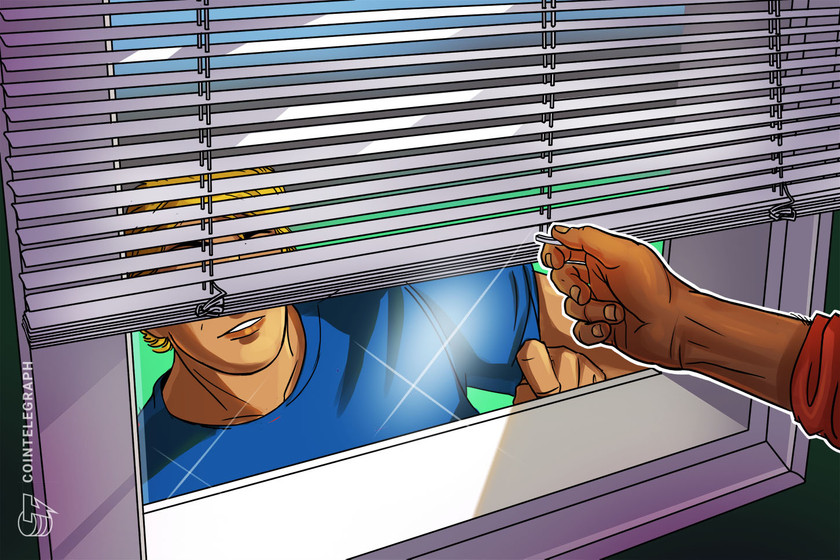 The Solana Foundation has given its take on the offensive meme coin issue that originates on the Solana blockchain. Austin Federa, head of strategy at the Solana Foundation, sustained that the core components of Solana should be permissionless while blocking some of these offensive assets should be left to individual applications. Solana Unlikely to Deal […]
The Solana Foundation has given its take on the offensive meme coin issue that originates on the Solana blockchain. Austin Federa, head of strategy at the Solana Foundation, sustained that the core components of Solana should be permissionless while blocking some of these offensive assets should be left to individual applications. Solana Unlikely to Deal […]
Wormhole is a cross-chain messaging protocol often used to transfer assets from one blockchain to another.
A $50 million fund has been launched to help startups that use the Wormhole cross-chain messaging protocol, according to a May 18 announcement. The new fund is being managed by venture capital fund Borderless Capital and is backed by over 20 other blockchain development teams and venture capital firms, including Circle, Polygon Ventures, Solana Foundation, JumpCrypto, and others.
It's time to make building in crypto more accessible than ever before.
— Wormhole (@wormholecrypto) May 18, 2023
Introducing the $50m Cross-Chain Ecosystem Fund, powered by Wormhole! pic.twitter.com/y3VeCsUrSa
The fund will help startups that are “innovating cutting-edge apps, infrastructure, or tools that span multiple ecosystems,” according to its application page on the Wormhole website, which also describes the fund as “anti-maxi” or promoting the idea that more than one blockchain is needed to solve users’ problems.
David Garcia, CEO & Managing Partner of Borderless Capital, stated that he thought the new fund would help to grow the Web3 economy and allow applications to attract new users:
“Our goal is to empower builders to transcend the limitations of individual ecosystems, paving the way for blockchain applications and protocols to realize their full potential."
Wormhole is a cross-chain messaging protocol. It allows different blockchain networks to communicate with each other and is often used to bridge assets from one network to another. For example, if a user wanted to transfer Ether (ETH) from the Ethereum network to the Solana network, they could do so using Wormhole. It is connected to over 20 different networks, the announcement said.
Other cross-chain messaging protocols include LayerZero, Celer, DeBridge, and many others.
Related: Uniswap debate between bridging protocols lays bare security concerns
Wormhole has expanded its network of partners in the past few months. In January, crypto exchange Uniswap chose it as the official bridging protocol for its cross-chain governance between Ethereum and BNB Network. And on April 26, Wormhole integrated with Circle’s Cross-Chain Transfer Protocol to allow for simpler transfers of US Dollar Coin from Ethereum to Avalanche.
However, Wormhole has also met with controversy over its security in the past. Its Solana bridge was hacked in February, 2022, leading to $321 million in losses. Developers later patched the faulty code that had led to the exploit and reimbursed all users.
Magazine: Should crypto projects ever negotiate with hackers? Probably

Solana Labs founder and CEO Anatoly Yakovenko said claims that Solana's network outages were caused by on-chain voting were born out of "pure ignorance."
Anatoly Yakovenko, the founder and CEO of Solana Labs has downplayed claims that Solana's network outages were being caused by a high volume of validator messages and its on-chain voting system clogging its consensus layer.
While the Solana Foundation confirmed in a Feb. 27 post that the “root cause” of the recent 20-hour network outage is still not clear, the CEO responded to speculation that Solana’s decision to include on-chain votes as transactions is a “massive design flaw” that has led to its many outages.
The controversial thread in question was posted by Twitter user DBCryptoX earlier on Feb. 27 days after Solana's 20-hour network outage, suggesting that the high volume of validator messages and on-chain votes were clogging the network.
1/Yesterday #Solana had another 20 hour outage
— DBCryptoX ⚡️ (@DBCrypt0) February 26, 2023
Just one of about a dozen times the ⛓️ has gone down. But why?
All part of a massive design flaw that I will try to break down in this
So let’s get into it… pic.twitter.com/KmeUPnnlZJ
However, Yankovenko in a response Tweet some 20 minutes later called the theory as coming from “pure ignorance.”
In short, he explained that the votes — which are part of a “single giant quorum” — contribute to provide an “exceptional level of security and high throughput and low fees” simultaneously.
Why are votes transactions? Every thread that I've seen that talks about this comes form pure ignorance.
— toly (@aeyakovenko) February 27, 2023
Classic BFT consensus requires quadratic messaging overhead.
The more nodes you have in the same quorum, the part of the network that agrees on the state, the more messages… https://t.co/8lOhICb8mn
However, Yakovenko didn’t exactly refute DBCryptoX’s claim that 90-95% of transactions on Solana comprise these validator messages and on-chain votes, which, DBCryptoX suggests has helped “bog down the system.”

DBCryptoX also claimed that the network outages were last 20 hours because it takes considerable time for validators to meet and reach a consensus (and thus a solution) using off-chain means, such as a messaging system like Discord.
Related: Solana Spaces will close New York and Miami stores 7 months after opening
Many commentators on DBCryptoX's initial post also appear to have disagreed with their theory.
Software engineer Alex Kroeger of Solana-powered Wallet Phantom said that there is likely no singular cause of the network outages and that validators of proof-of-stake systems need a lot of network communication to achieve validation.
While the network officially restarted on late Feb. 25, it appears as though members of the cryptocurrency community are getting tired of the frequent network outages on Solana.
Cointelegraph reached out to Solana Labs for comment but didn't receive a response by the time of publication.

Norby said the “experiment” was part of a plan to onboard more people onto Solana, but the stores didn’t bring in as many users as they initially hoped.
Solana Spaces will close down its two Solana (SOL)-themed, community-oriented retail stores in New York City and Miami at the end of the month, as the physical stores didn’t onboard as many users as initially anticipated.
Solana Spaces tweeted the news on Feb. 21, sharing a note from founder Vibhu Norby explaining the reasons behind the store shutdowns.
The following is a note from our founder, @vibhu.
— Solana Spaces (@solanaspaces) February 21, 2023
Dear @solanaspaces community,
We’ve made the difficult decision to sunset our stores in NYC and Miami by the end of February, and to pivot our Solana onboarding efforts into digital products like DRiP, our free NFT product with… https://t.co/kjNu9Ay4Gk
Norby — who founded Solana Spaces in early 2022 — explained that the company reached an “inflection point” with the stores, prompting them to shift its investment focus to “DRiP,” the firm’s new nonfungible token artwork airdrop platform.
“While our stores onboard between 500 and 1,000 people per week, DRiP onboards that same quantity EVERY DAY,” Norby said, explaining the decision to shift its investment focus.
The decision to close the shops — located in the Hudson Yards neighborhood of Manhattan and the Wynwood section of Miami — was made “a few weeks ago,” and they will “sunset” at the end of February, Norby said.
The ambitious initiative was relatively short-lived, with the two stores having only officially opened in late July and August in New York and Miami respectively.
Norby said the “experiment” was part of a broader plan to onboard more people into the Solana and Web3 ecosystem:
“Our endowed mission from day one was to experiment with new and disruptive models to bring people to Web3, and to serve the community on behalf of the Solana Foundation.”
“As I told people often, as awesome as the stores were, if we found a more efficient way to bring people into Solana, we would throw our efforts at that,” he added.
But as he has since realized, the firm’s efforts may achieve better results in the digital realm with DRiP.
The Solana-themed stores offered customers the opportunity to partake in all things from in-person wallet onboarding tutorials, earning rewards, merchandise shopping and attending events.

When Solana Spaces opened its first New York-based store in late July, Norby hoped the store would bring in more than 100,000 people to Solana per month.
However, Norby stated in his letter that only 75,000 people managed to walk into the store over the course of its seven-month tenure.
Related: The state of Solana: Will the layer-1 protocol rise again in 2023?
The startup was sponsored by the Solana Foundation, the Solana-based wallet provider Phantom and the native crypto exchange Orca, and while it didn’t work out, it did appear to have won over a lot of fans.
Just visited for my 2nd time a few days ago!
— Investrepreneuer.sol (@LordHearMePray) February 15, 2023
Thank you for the experience!
Every time I come to Miami I have to make a pilgrimage to SolanaSpaces pic.twitter.com/ugCqbSyIzg
Several Solana-native industry players, such as the videogame projects Star Atlas and Aurory, thanked Solana Spaces for its contribution to the ecosystem.
We're sad to hear the news of @solanaspaces closing their Miami and NYC stores The events that Star Atlas attended and hosted there were beyond incredible!
— Star Atlas (@staratlas) February 21, 2023
Even so, we can't wait to see what comes from their pivot to DRiP! https://t.co/4voal4yzfC pic.twitter.com/bXV8PKG6LE
The closure comes as the prolonged crypto winter has caused many industry-leading companies to lay off staff and close down offices all around the world.
 Following the FTX collapse and amid the aftermath, people have been wondering about the company’s Crypto Bahamas conference that was scheduled to happen on April 17-20, 2023, at the exclusive Grand Hyatt Baha Mar, in Nassau. The event planned for April 2023 was supposed to be hosted by the now-bankrupt FTX and the Skybridge Capital-backed […]
Following the FTX collapse and amid the aftermath, people have been wondering about the company’s Crypto Bahamas conference that was scheduled to happen on April 17-20, 2023, at the exclusive Grand Hyatt Baha Mar, in Nassau. The event planned for April 2023 was supposed to be hosted by the now-bankrupt FTX and the Skybridge Capital-backed […]
A class-action lawsuit has been filed against layer-1 blockchain Solana (SOL) on the grounds that the smart contract platform is not as decentralized as advertised. In a court filing dated July 1st, Solana investor Mark Young alleges SOL cannot fit the definition of “decentralized” when nearly half of its supply is in possession of people […]
The post Investors File Lawsuit Against Solana Labs Alleging SOL Is ‘Highly Centralized’ Unregistered Security appeared first on The Daily Hodl.

The Solana blockchain has reportedly suffered another DDoS attack that temporarily clogged the network, however the network appeared to remain online.
Solana's blockchain performance was reportedly hit by a distributed denial of service (DDoS) attack over the past 24 hours, however the network appears to have remained online throughout.
A DDoS attack generally refers to a large number of coordinated devices, or a botnet overwhelming a network with fake traffic to take it offline.
This wouldn't be the first time Solana has suffered this issue, with Cointelegraph reporting in September that the network suffered a 17-hour-outage due to mass botting activity for an initial DEX offering (IDO) on Solana-based DEX platform Raydium.
The latest DDoS attack was highlighted by Solana-based NFT platform Blockasset on Dec. 9 around 3 pm UTC, after it noted that:
“We are aware tokens are taking a long time to distribute. The Solana chain is being overloaded with DDoS attacks which have clogged the network causing delays.”
Solana-focused infrastructure firm GenesysGo also reported on the matter, stating that the validator network was experiencing issues with processing transaction requests, but called for calm as it attributed the problem to “growing pains.”
The #Solana validator network is experiencing issues this morning. TPS issues as the network works to process txn requests.
— GenesysGo.sol - Shadowy Super Coder DAO (@GenesysGo) December 9, 2021
Remember, this is blockchain If your txn ID went through then it’s not lost, just pending. Growing pains is all! pic.twitter.com/2Zfagq092M
At this stage, the nature of the incident is unclear as Solana Foundation is yet to publicly confirm any attacks, while Status.Solana shows that the network has not suffered any outages and is fully operational at the time of writing.
However multiple accounts on Twitter asserted that Solana suffered a global outage, with Verbit CEO Roy Murphy (and BSV proponent) stating that “Solana crashed again and is currently offline. Engineers are looking into ‘rebooting the system.’ Seriously, you can't make this shit up!”.
Earlier today members of the r/Solana subreddit attributed the network clogging to another IDO launch on Raydium, with user “u/Psilodelic” writing a post titled “Why do Raydium IDOs clog the Solana network and what is being done about this?”.
“My biggest concern about Solana right now is the performance impact during high volume activity connected to Raydium IDOs and launches. Literally every single performance issue in the past 6 months, including the 17-hour outage, has been a result of a launch on Raydium,” they wrote.
Related: Decentralized and scalable exchange leverages Solana for an improved trader experience
In response, one of the group’s moderators “Laine_sa” didn’t explicitly confirm if the Solana’s network’s issues were once again Raydium related, but did note there have been concerted “stop gaps” put in place to keep Solana online since the DDoS attack from September:
“Right now there's a stop-gap in place that prioritizes vote transactions to prevent a full crash, there are additional changes to compute limits and fees relating to this in the works but it's not a quick fix that can be rolled out in a few weeks which is why it's taking time. It's being looked at however.”
Cointelegraph has reached out to multiple Solana developers for comment on the DDoS attack, and will update the story if they respond.
According to data from Coingecko, the price of Solana (SOL) has dipped 6.4% over the past 24 hours to sit at $182.79 at the time of writing. Amid a pullback across most of the top crypto assets, SOL has fallen 26.1% over the past 30 days.

Solana Labs’ co-founder thinks the fight between Ethereum and so-called “ETH Killers” is unnecessary, as the true aim for people working in crypto should be to onboard “every human” onto Web 3.0.
While many pundits have labeled Solana (SOL) as an "Ethereum killer" due to its lower fees and faster transaction times, Solana Labs co-founder Raj Gokal said the project has no desire to kill the cryptocurrency — and wouldn’t be able to if it did.
Gokal made the comments in response to a Nov.10 Twitter post from the co-founder of venture capital firm Placeholder, Chris Burniske who wrote that “despite pretty words, L1 knives are fully out. In crypto, generally, people want their biggest bags to win.”
“This will influence almost all communications, so don't take what you see and hear as truth,” he added,
In response, Gokal emphasized that “it doesn’t have to be a fight” as he argued that the goal for all people working in the crypto space should be to onboard “every human” on to Web 3.0, and noted that:
“’Knives out’ implies we are trying to kill Ethereum. Ethereum cannot be killed, it’s impossible. And it’s already a beautiful force of good in the world, empowering millions and creating billions in wealth. Bitcoin is quite obviously the same.”
According to CoinGecko, SOL is currently the fifth-ranked digital asset in terms of total market cap with $71.7 billion, and is ahead of fellow ‘ETH killer’ Cardano (ADA) at sixth with $67.4 billion. ETH sits well ahead of the two in second place with a market cap of around $564.7 billion.
Solana has been making up a lot of ground lately however. It's up 11,742% over the past year to sit at $237.53, while ETH has gained 931% within that time frame to reach around $4,800.
I know you may not even be talking about @solana, and if so I apologize. but I’m just sad and disappointed that every time non-ethereum chains like solana see success or take big swings at growing, it’s seen as taking swings against incumbents.
— Raj Gokal (@rajgokal) November 10, 2021
we are trying to grow the movement
Earlier this week the Solana Foundation hosted the “Solana Breakpoint 2021” conference in Lisbon, Portugal featuring guests such as Gokal, CEO and co-founder of Solana Labs Anatoly Yakovenko, FTX CEO Sam Bankman-Fried, Reddit co-founder Alexis Ohanian and Circle CEO Jeremy Allaire.
Speaking on day one of the event, Gokal stated that the Solana ecosystem has been “exploding” in 2021 across every vertical and “use case.” The co-founder highlighted data showing 2.2 million NFTs were minted on the Solana blockchain within three months, along with more than $15 billion worth of total value locked in Solana-based DeFi as of Nov. 7 ($14.47 billion at the time of writing).

Related: NYDFS-licensed Standard Custody brings Solana staking to institutions
In a Nov. 12 post titled “The Perpetual SOL Rise” from Messari researcher Dustin Teander, he noted that “Solana has received sizable investor attention over the last quarter,” and pointed to a long list of promising “growth catalysts” for the project.
“In many respects, the price discovery has been healthily fueled across various sectors — a $100M gaming fund announced, Brave announcing native integration on the Web3 front, $100M investment from Reddit for Social Media, $40M raised by Neon Labs to bring EVM infrastructure over, pplpleasr launching NFTs on Solana, FTX building out an NFT integration.”
“And, of course, there’s Solana’s DeFi ecosystem that has seen a 4x TVL expansion since September,” he added.